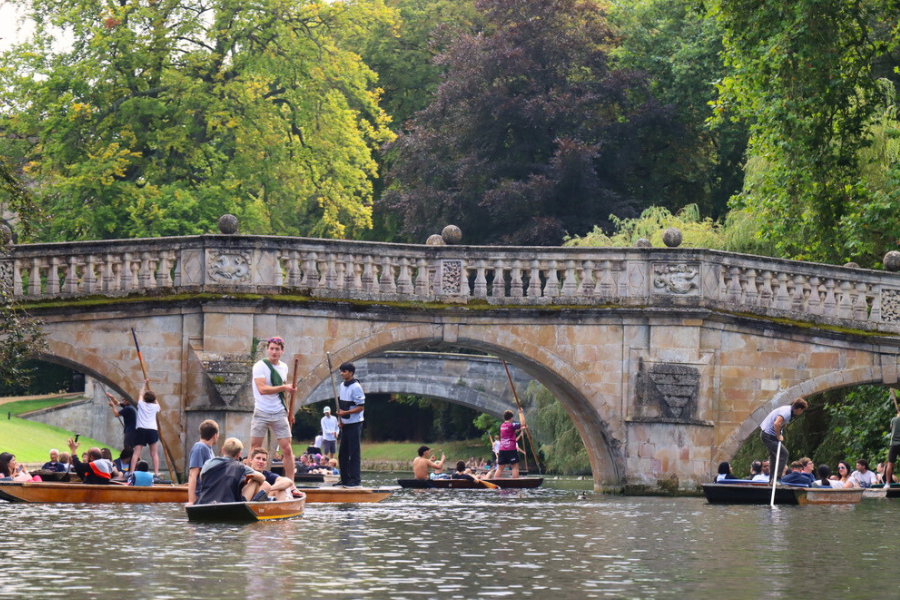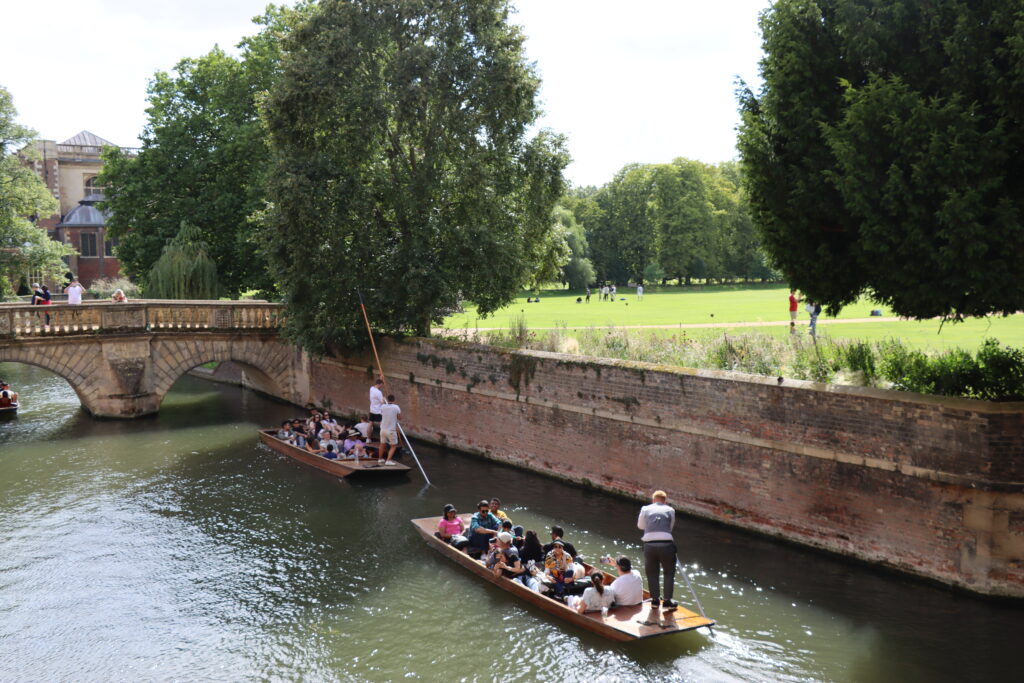Exploring LGBTQIA+ Legacies Along the River Cam
As your punt glides beneath willow branches and under historic bridges, you’re not just drifting through Cambridge’s beauty. You’re tracing the stories of radical thinkers, hidden love affairs, and defiant change-makers.
From pioneering reformers to contemporary activists, the colleges lining the River Cam have shaped—and been shaped by—queer history. Join us as we uncover the LGBTQIA+ legacies hidden behind the storied walls of Cambridge’s riverside colleges.
Magdalene College: Secret Societies and Legal Reform
The first college you’ll spot on your punting tour is Magdalene College, and it has a surprisingly bold place in LGBTQIA+ history.
George Cecil Ives
While at Magdalene, Ives founded the Order of Chaeronea (1897), a secret society for homosexual men. He was a poet, sexologist, and early reformer. He advocated for humane treatment of prisoners and the decriminalisation of homosexuality—decades before it was publicly acceptable.
Antony Grey
Antony Grey (born Anthony Wright) was a champion of gay rights. He led the Homosexual Law Reform Society and Albany Trust, working tirelessly toward the partial decriminalisation of homosexuality in 1967. His legacy lives on in the Magdalene College Library, where his personal papers are preserved.
Nick Herbert MP
As the first openly gay Conservative MP, Herbert founded the Freedom to Marry campaign. His efforts helped bring about the 2013 Marriage (Same-Sex Couples) Act, ushering in a new era of legal equality in the UK.

image from https://www.instagram.com/p/CQt679kFFi1/
St John’s College: Love, Theatre, and Quiet Defiance
Next along the river comes the grand silhouette of St John’s College, home to one of Britain’s most celebrated actors:
Sir Derek Jacobi
At Cambridge in the 1950s, when homosexuality was criminalized, Jacobi fell in love and came out to his mother. Despite the risks, he embraced his identity and built a long, award-winning career in theatre and film. He remains an icon of quiet strength and LGBTQ+ visibility.
“Cambridge gave me my passion for theatre—and a chance to understand myself.”
— Derek Jacobi, The Guardian
Trinity College: Intellectual Powerhouse and Pride Trailblazer
Trinity College has seen increasing visibility of LGBTQ+ students and events in recent years. It also plays host to Pride formals, inclusive campaigns, and active college LGBTQ+ reps. Today, it’s part of the ongoing transformation of Cambridge into a more visibly queer-friendly institution. Trinity’s vast grounds have witnessed centuries of quiet defiance and growing pride.
Trinity Hall: Radical Love and Revolutionary Thinking
Tucked beside Clare and King’s, Trinity Hall is closely associated with a quietly radical figure in British queer history:
Edward Carpenter
A philosopher, poet, and early advocate for sexual liberation, Carpenter challenged Victorian norms and lived openly with his partner George Merrill. His writings influenced both queer theory and global social movements, including Gandhi’s philosophy of simplicity and resistance.
Clare College: Gardens, Bridges, and Gradual Visibility
With one of the most beautiful riverfronts on the Cam, Clare College today embraces LGBTQ+ inclusivity through events, representation, and student support. While the college’s historical records on queer figures may be quieter, Clare is now a progressive and welcoming space for all identities.
King’s College: Genius, Persecution, and Posthumous Pride
Visible just after Clare College, the iconic chapel of King’s College rises above the River Cam. Its soaring Gothic architecture is a highlight of any punting tour—but behind its beauty lies one of queer history’s most powerful and painful stories.
Alan Turing
Turing was a brilliant mathematician who studied at King’s College, Cambridge in the 1930s. His ideas helped lay the foundation for modern computer science. During World War II, he played a key role at Bletchley Park by helping to break the German Enigma code—work that may have shortened the war by several years and saved millions of lives. For this, he was awarded an OBE in 1946.
Despite his achievements, Turing faced persecution because he was gay. In 1952, he was arrested under laws that criminalised homosexuality in the UK. Instead of going to prison, he accepted chemical castration. Two years later, he died from cyanide poisoning—officially ruled a suicide, though some question that conclusion.
Turing’s story later became a symbol of the injustice faced by LGBTQ+ people. He was granted a royal pardon in 2013, and in 2017, the UK introduced the “Turing Law,” pardoning thousands of others convicted under outdated anti-gay laws. Today, Turing is honoured around the world—not only for his genius, but as a powerful symbol of resilience. His face now appears on the £50 note, a tribute to a man once punished by the country he helped save.
“We can only see a short distance ahead, but we can see plenty there that needs to be done.”
— Alan Turing
Beyond the Backs: Hidden Heroines and Gender Rebels
While not visible from the Cam, colleges like Newnham and Girton have played an essential role in queer history—especially for women, non-binary people, and gender-nonconforming students.
These were among the first institutions to provide women access to higher education in Britain, and they became safe havens where students could explore intellectual freedom, female friendship, and sometimes coded romantic relationships.
“Queer history isn’t always loud—it’s sometimes found in letters, diaries, or the decision to simply exist differently.”
Today, these colleges are actively involved in creating inclusive spaces and documenting lesser-known queer legacies through initiatives like Queer Between the Covers and the Cambridge LGBTQ+ Archive.
LGBTQIA+ Life at Cambridge Today
From whispers to parades, Cambridge has transformed into a visibly queer-friendly city. Today, queer students are supported by vibrant networks, including:
- Cambridge SU LGBTQ+ Campaign
- College LGBTQ+ Societies and Pride Formals
- Queerfest, LGBTQ+ History Month exhibitions, and Pride Cambridge
- The “Out at Cambridge” report documents lived experiences and inclusion progress
Many colleges now fly the Progress Pride Flag, offer gender-inclusive facilities, and hold open conversations on intersectionality and support for trans and non-binary students.
See Queer Cambridge from the River
At The Traditional Punting Company, we’re proud to share Cambridge’s rich, evolving queer history from the water. On your punting tour, you’ll pass:
- The college where Alan Turing mastered logic
- The windows behind which Derek Jacobi found his first love
- The library that preserves Antony Grey’s legacy
- The courts where early resistance quietly took shape
Each ripple in the river reflects centuries of change—and countless personal stories.
Book a Punting Tour with us, to experience the city like never before: with pride, purpose, and perspective.
Final Thought
The queer story of Cambridge is still being written—by students, activists, scholars, and everyday people finding pride in who they are. As we glide past the college backs, we celebrate not only those who came before, but those shaping the future today.
Come float through history with us—and leave a little prouder.
Posted on June 19th, 2025, by the Traditional Punting Company Editor










